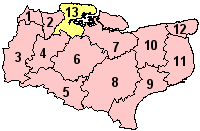

| Kent County Council | |
 http://www.kent.gov.uk/ | |
| Executive | |
|---|---|
| Kent Cabinet |
|
| Districts and Unitaries | |

| |
Kent County Council (KCC) is the county council that governs the majority of the county of KentinEngland. It comprises 12 district councils, and around 300 town and parish councils. The county council has 84 elected councillors. The Chief Executive and his team of chief officers are responsible for the day-to-day running of the council.
Kent County Council co-operates with Medway Council in many ways, for instance in the Kent and Medway Local Plan, and together they run joint agencies.
Kent is combined with Medway for the purposes of representation in Parliament. The combined area elects 17 MPs, of whom 14 represent seats entirely within the Kent County Council area and another whose constituency is in both Kent and Medway. The combined area is also part of the South East region of the UK, which elects a total of ten members to the European Parliament.
Kent County Council is currently controlled by the Conservative Party.
The council is responsible for public services such as education, transport, strategic planning, emergency services, social services, public safety and waste disposal.
See also [1]
The County Council is made up of 84 elected county councillors. The full council meets seven times a year to agree the council's Constitution and amendments to it, appoint the Leader, and approve the policy framework and budget (including the level of Council Tax).
The cabinet is made up of ten county councillors. The cabinet is responsible for the strategic thinking and decisions that steer how the council is run. The cabinet meets monthly and take decisions collectively.
Local boards are local community groups that hold regular public meetings across Kent so that the people of Kent to voice issues that affect their community. They also allocate funding to local projects. There are 12 local boards in Kent, and every county councillor is required to be a member of one local board.
The work of the Council is organised into departments and divisions.
See also [2]
The next Kent County Council election will be held in May 2009. See also Kent local elections, Ashford local elections, Canterbury local elections, Dartford local elections, Dover local elections, Tonbridge and Malling local elections
The Local Government Act 1888 created an administrative county of Kent, with its own county council, in 1889. At the same time the northwestern extremities of the historic county of Kent came under the County of London, while Canterbury became a separate county borough with powers similar to that of a county. The county council's duties at first were few, but gradually it absorbed school boards, the rural highway boards and the boards of guardians.
The London Government Act 1963 created an enlarged Greater London, established in 1965, which took in more of northwestern Kent. The Local Government Act 1972 abolished the previous structure of local government as from 1974. Kent became a non-metropolitan county, divided into districts, including a new City of Canterbury, which combined the former county borough (now abolished) with other areas to form a single district under the county council.
In1998 the districts of Gillingham and Rochester-upon-Medway were removed from the control of the county council to come under the control of a new unitary authority, Medway Council.
It was reported on 9th October 2008 that Kent County Council had a total of £50m invested in the Icelandic banks taken over by the Icelandic Government. (1) This taxpayers money could be at risk and Kent County Council is one of a number of authorities in this position.
(1) http://news.bbc.co.uk/1/hi/uk_politics/7660438.stm